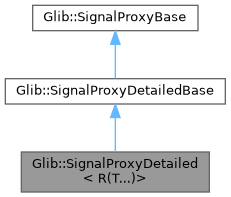Proxy for signals with any number of arguments and possibly a detailed name. More...
#include <glibmm/signalproxy.h>

Public Types | |
| using | SlotType = sigc::slot< R(T...)> |
| using | VoidSlotType = sigc::slot< void(T...)> |
Public Member Functions | |
| SignalProxyDetailed (ObjectBase *obj, const SignalProxyInfo *info, const Glib::ustring &detail_name) | |
| sigc::connection | connect (const SlotType &slot, bool after) |
| Connects a signal handler to a signal. | |
| sigc::connection | connect (SlotType &&slot, bool after) |
| Connects a signal handler to a signal. | |
| sigc::connection | connect_notify (const VoidSlotType &slot, bool after=false) |
| Connects a signal handler without a return value to a signal. | |
| sigc::connection | connect_notify (VoidSlotType &&slot, bool after=false) |
| Connects a signal handler without a return value to a signal. | |
 Public Member Functions inherited from Glib::SignalProxyDetailedBase Public Member Functions inherited from Glib::SignalProxyDetailedBase | |
| ~SignalProxyDetailedBase () noexcept | |
| void | emission_stop () |
| Stops the current signal emission (not in libsigc++) | |
 Public Member Functions inherited from Glib::SignalProxyBase Public Member Functions inherited from Glib::SignalProxyBase | |
| SignalProxyBase (Glib::ObjectBase *obj) | |
Additional Inherited Members | |
 Protected Member Functions inherited from Glib::SignalProxyDetailedBase Protected Member Functions inherited from Glib::SignalProxyDetailedBase | |
| SignalProxyDetailedBase (Glib::ObjectBase *obj, const SignalProxyInfo *info, const Glib::ustring &detail_name) | |
| Creates a proxy for a signal that can be emitted by obj. | |
| sigc::slot_base & | connect_impl_ (bool notify, const sigc::slot_base &slot, bool after) |
| Connects a signal handler to a signal. | |
| sigc::slot_base & | connect_impl_ (bool notify, sigc::slot_base &&slot, bool after) |
| Connects a signal handler to a signal. | |
 Protected Attributes inherited from Glib::SignalProxyBase Protected Attributes inherited from Glib::SignalProxyBase | |
| ObjectBase * | obj_ |
Detailed Description
Proxy for signals with any number of arguments and possibly a detailed name.
Use the connect() or connect_notify() method, with sigc::mem_fun() or sigc::ptr_fun() to connect signal handlers to signals.
This is the primary template. There is a specialization for signal handlers that return void. The specialization has no connect_notify() method, and the after parameter in its connect() method has a default value.
Member Typedef Documentation
◆ SlotType
◆ VoidSlotType
Constructor & Destructor Documentation
◆ SignalProxyDetailed()
|
inline |
Member Function Documentation
◆ connect() [1/2]
|
inline |
Connects a signal handler to a signal.
For instance, connect(sigc::mem_fun(*this, &TheClass::on_something), false);
For some signal handlers that return a value, it can make a big difference whether you connect before or after the default signal handler. Examples:
- Gio::Application::signal_command_line() calls only one signal handler. A handler connected after the default handler will never be called.
- X event signals, such as Gtk::Widget::signal_button_press_event(), stop calling signal handlers as soon as a called handler returns
true. If the default handler returnstrue, a handler connected after it will not be called.
- Parameters
-
slot The signal handler, usually created with sigc::mem_fun() or sigc::ptr_fun(). after Whether this signal handler should be called before or after the default signal handler.
- Returns
- A sigc::connection.
◆ connect() [2/2]
|
inline |
Connects a signal handler to a signal.
◆ connect_notify() [1/2]
|
inline |
Connects a signal handler without a return value to a signal.
By default, the signal handler will be called before the default signal handler.
For instance, connect_notify( sigc::mem_fun(*this, &TheClass::on_something) );
If the signal requires signal handlers with a return value of type T, connect_notify() binds return T() to the connected signal handler. For instance, if the return type is bool, the following two calls are equivalent.
- Parameters
-
slot The signal handler, which should have a voidreturn type, usually created with sigc::mem_fun() or sigc::ptr_fun().after Whether this signal handler should be called before or after the default signal handler.
- Returns
- A sigc::connection.
◆ connect_notify() [2/2]
|
inline |
Connects a signal handler without a return value to a signal.